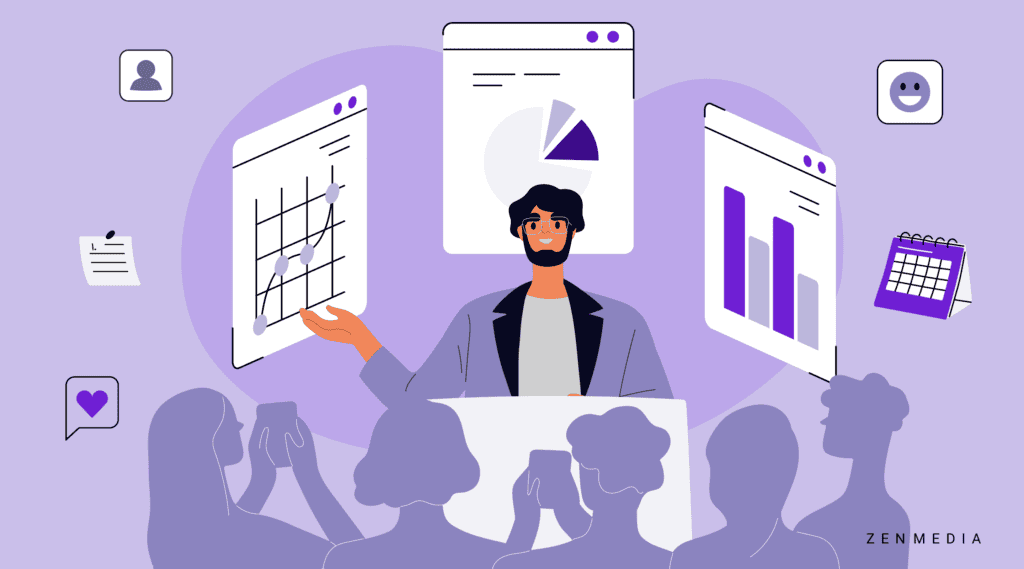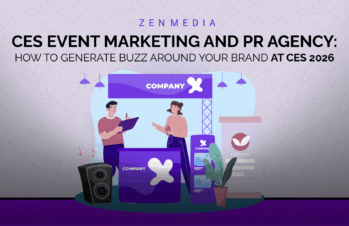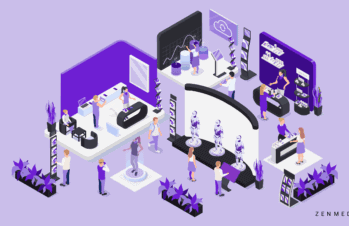Event marketing and experiential marketing are sometimes seen as the same thing.
However, while experiential marketing is designed to create a two-way engagement with the customer, in which the brand and customer engage in a dialogue, event marketing refers to opportunities like trade shows, product demos, brand-sponsored conferences, panels, and more—which can be virtual, in-person, or both.
Events like these can be critical for B2B businesses, as industry networks are so important to success. So how can you ensure that you’re not only giving potential customers everything they need to choose your brand over your competitor? And how can you measure your event success?
The answer is to implement an event marketing strategy! This will round out your marketing objectives and result in business growth by helping you reach your target audience, enhance your business relationships, increase brand visibility, contribute to your content marketing, and build industry connections.
In this guide, we’ll show you how to build an effective event marketing strategy that generates buzz, fosters meaningful interactions, improves customer relationships, and builds your brand recognition.
What is B2B event marketing?
B2B event marketing is a form of marketing where businesses invite other businesses to attend events in order to network and learn about new ideas and technologies. The goal of these events is to increase sales leads and revenue through networking opportunities and to bring together business owners from different industries who may be interested in learning about each others’ products and services.
Major trade shows in the tech space include CES and NAB Show, but there are a variety of impactful events available to companies across industries. While we’re seeing more and more companies opting for in-person events in 2025, hybrid and virtual events remain popular options. Consider accommodating different event types to enhance attendee engagement and participation.
Related reading: Mastering SoLoMo: Essential Strategies for Effective Marketing in 2025
Tips to consider for effective B2B event marketing
Corporate events are great for building lead generation and meaningful relationships in the B2B space. The key is to create a memorable experience for attendees.
To do this, you need to plan carefully and be creative. Here are some tips:
- Make sure all details are planned out ahead of time.
- Have a clear call to action at the end of each session.
- Provide freebies like pens, business cards, etc. Get creative with your freebies to reach a broader audience and boost your brand identity. Read about
- Create a plan for post-event follow-ups. Work this into your social media campaigns and email marketing efforts.
- Use video recordings of sessions for your virtual or hybrid event attendees.
- Include interactive promotions that extend to post-event activities.
- Offer incentives such as discounts or free trials.
- Send thank you notes to participants and invite them to your next event.
- Keep track of attendee lists and reach out periodically. Leveraging technology like AI and ML can help you personalize post-event marketing materials.
- Don’t forget about LinkedIn and other social channels! Stretch those marketing materials across different platforms, including thought leadership, blog posts, and more.
What goes into a successful B2B event marketing campaign?
Putting together a successful B2B event marketing campaign involves several steps:
- Identifying your audience, accounting for both prospects and existing customers.
- Establishing goals and KPIs.
- Developing your speaker and/or sponsor list.
- Creating your promotional plan, including email marketing, content, and social media.
- Monitoring social mentions during the event.
- Post-event analysis and evaluation.
Below, we’ve outlined the different ways you can achieve each of your marketing goals to extend your event’s impact.
1. Identify your target audience
Determine which target audience your event is trying to reach. This will depend on the type of event you’re hosting, and what you’re trying to achieve with it.
If it’s a product demo at a trade show, your event’s audience will most likely consist of new customers who are also attendees at the trade show. You might also attract reporters, bloggers, and other industry experts.
If it’s a virtual event, your audience may be more diverse. There are your current customers, potential customers, industry insiders, and people from other sectors who may be interested in the topic or purpose of the conference.
Once you’ve established who you want to reach, segment your audience types out so you can develop messaging geared toward each group.
2. Establish your goals and KPIs
What are your event goals? Instead of simply “raising awareness” or “expanding our brand reach,” think about specific key performance indicators (KPIs) you can track.
For example: do you have a set number of registrations you want to achieve, or a number of product sales you want to make?
Do you want to increase your prospect list by a certain percentage?
Write these down and decide which goals are most important, how you’ll measure them, and how you can make adjustments for future events. To do this, you’ll need the right tools. We like Google Analytics, a social listening tool, and possibly a PR analytics platform like Cision or Meltwater.
3. Develop your speaker list
When hosting events that include speakers, like a panel or a conference, you have to strike a balance: find people who can speak on topics your audience is interested in, as well as those who have an engaged following.
There’s no need to seek out mega influencers to draw a big crowd. In fact, mega influencers often draw less engagement than those who cover a more specific niche. Find someone who’s popular within their space, yet knowledgeable and personable.
4. Create your promotional plan, including email marketing, content, and social media.
In the weeks leading up to your event, you’ll need to include a variety of different digital marketing outreach tactics.
Email marketing should be a top priority, as you’ll want to send out multiple emails leading up to the event (and afterward) to your segmented audience. Typically, there should be:
- An announcement email with a link to register early
- A follow-up email once the regular registration period opens
- A reminder email about your event listing speakers, panels, and any other details that were previously unconfirmed
- A post-event email to attendees asking for feedback, sharing takeaways, and including a call to action to follow you on social, sign up for your newsletter, or download a piece of content (choose just one!)
Content-wise, you can write a blog post about the event, create a short video where you explain what will happen and ask people to sign up, go live on your social networks to announce the event, share updates on your speaker list, and/or answer questions.
For social media, you should be posting about the event regularly to share details and behind-the-scenes footage. A good practice is to create an event-specific hashtag, and use it on every event-related post you share. Encourage your followers to do the same!
5. Monitor social mentions during the event.
During your event, have at least one person tasked with monitoring social media mentions of your event and speakers. They should be tracking not only your event hashtag, but also other keywords related to your event and what your speakers are posting.
Don’t forget to amplify your content! Sharing, reposting, and interacting online during and after makes for a more engaging event. Plus, you’ll extend the life of your content.
6. Analyze and evaluate your event once it’s complete.
Once your event is over, it’s time to look at your analytics. Based on the KPIs you set initially, you can determine how well you did in terms of meeting each B2B event marketing goals.
The analytics will give you the quantitative feedback you need to improve your next B2B event marketing campaign. But it’s also important to get qualitative feedback from your attendees. You can do this by sending out a survey, putting up a poll online, emailing speakers personally to get their thoughts, or sending out a request for feedback to any private online networks you have.
Partnering With a B2B Events Agency
As a B2B event marketing agency we take a holistic approach to event marketing, starting from the very beginning. We handle all of the steps mentioned above—and so much more!
If you’re putting on a conference, we can handle everything from finding a venue to booking speakers.
If it’s a pop-up product demo, we’ll work with you to find a suitable location and employ the latest marketing technologies, like location-based targeting, to bring people in.
While your event is happening, we track online mentions and user-generated content. Plus, we amplify both to ensure you get the greatest possible reach.
And we don’t stop once the event is over. Afterward, we analyze the agreed-upon KPIs, as well as the B2B marketing event’s digital footprint and hard data like the percent increase in sales, newsletter sign-ups, and more.
Our goal isn’t just to deliver a successful B2B event marketing campaign, but to provide you with a clear idea of why it was successful and how that can be replicated.
Sound like something your brand could use? Let’s talk.





